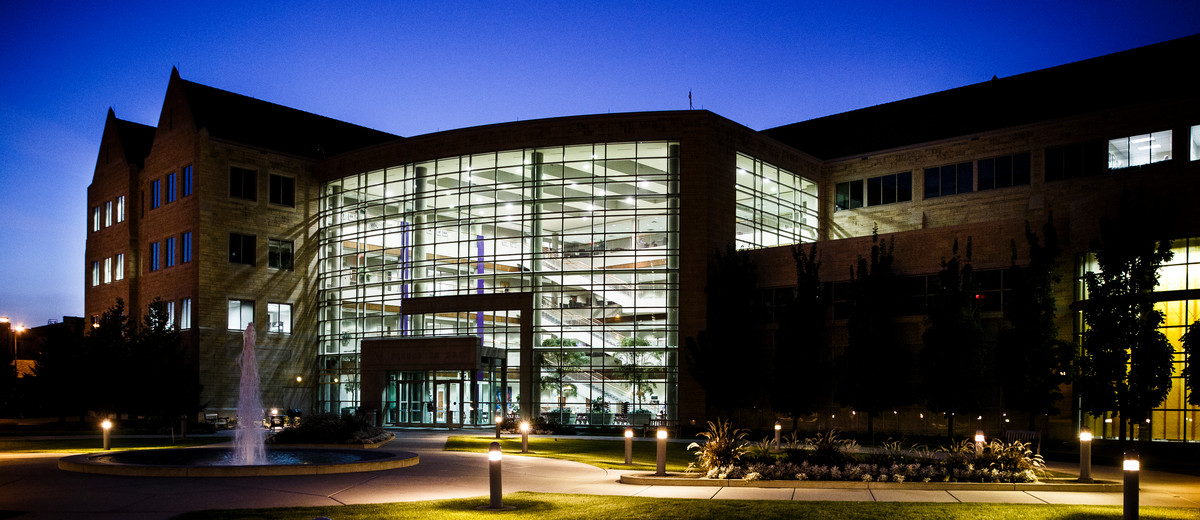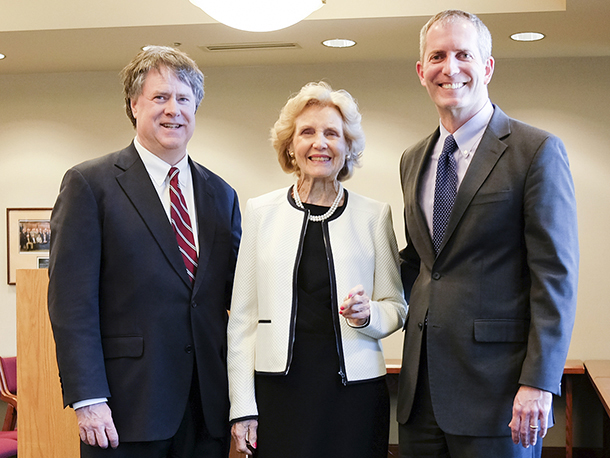This spring, the University of St. Thomas School of Law celebrated the investiture of four faculty members to endowed chairs and professorships: Robert Delahunty, Neil Hamilton, Mark Osler and Virgil Wiebe.
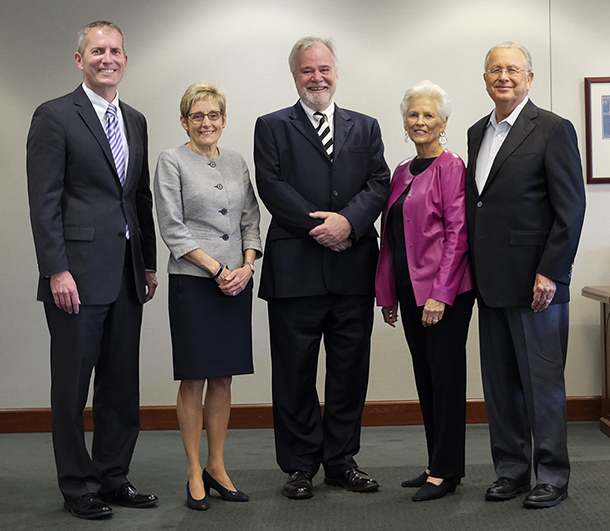
From left: School of Law Dean Robert K. Vischer, St. Thomas President Dr. Julie Sullivan, Professor Robert Delahunty, Jean LeJeune and Larry LeJeune.
Robert Delahunty holds the Laurence and Jean LeJeune Distinguished Chair. Delahunty has produced pioneering scholarship on a range of topics, most notably at the intersection of international law, the Constitution and executive power.
“As part of the chair appointment process, we solicit outside scholars to evaluate the candidate’s work,” Dean Robert Vischer said. “Robert’s outside reviewers were well-known scholars from Top 14 law schools. Their assessments were glowing, affirming Robert’s status as a scholar of national stature who would merit an endowed chair at their own schools.”
Prior to joining the faculty at St. Thomas Law, Delahunty spent most of his legal career with the U.S. Department of Justice Office of Legal Counsel, where he was made special counsel and member of the Senior Executive Service, prior to serving as deputy general counsel for the White House Office of Homeland Security.
As a professor, he has twice been selected by the graduating class as Professor of the Year. Delahunty is the classic law professor—employing the Socratic method to push students to hone their critical thinking and analysis—but his teaching extends far beyond the classroom, as he routinely opens his home to students for dinners and social events.
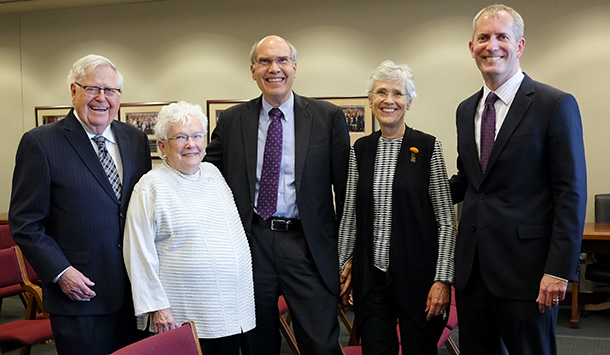
From left: Professor Emeritus Tom Holloran, Patty Holloran, Professor Neil Hamilton, Uve Hamilton and School of Law Dean Robert Vischer.
Neil Hamilton holds the Holloran Endowed Professorship. A founding member of the St. Thomas Law faculty, Hamilton has become the leading scholar helping legal educators understand how the formation of professional identity occurs and why it matters. His award-winning “Roadmap” book has the potential to reshape how law schools prepare students for employment, integrating longstanding professional ideals and a deep service ethic with practical knowledge about essential employment skills.
As a teacher, Hamilton’s Ethical Leadership course in particular can be a life-changing experience for students. Hamilton invests himself in his students, providing thoughtful reflections on their journal entries and engaging in wide-ranging, deep discussions about vocation.
“Aside from the normal student traffic any professor has, Neil proactively seeks out more time with students, whether by inviting them to join his research assistant teams to produce cutting-edge scholarship, coaching dozens of them each year on employment preparation, making himself available to listen as students navigate thorny life issues, or providing a career-long sounding board on ethics issues,” Vischer said. “Neil Hamilton’s legacy is a beautiful reminder that, even for a leading scholar who takes research very seriously, our students are not a distraction from our work; they are our work.”
Mark Osler holds the Robert and Marion Short Distinguished Chair in Law. Osler writes and teaches for impact, working at the forefront of efforts to reform the U.S. criminal justice system on a range of issues. A former federal prosecutor, he won the Spears v. United States case before the U.S. Supreme Court, helping reduce the sentencing disparity between possession of crack and powder cocaine, and has been a leader in bringing attention to the broken federal clemency system, helping chart a new course through his scholarship and advocacy via relationships at the highest levels of government.
Osler’s teaching is an outgrowth of his advocacy, as he started the first legal clinic in the nation devoted to federal commutations. His clinic has become a model for nearly two dozen other law schools, including Yale, giving St. Thomas Law students the experience of petitioning on behalf of federal prisoners whose sentences are unduly harsh and unjust.
“According to the Old Testament scholar Walter Brueggemann, prophecy in the Hebrew tradition constituted an ‘assault on public imagination, aimed at showing that the present presumed world is not absolute, but that a thinkable alternative can be imagined, characterized, and lived in,’” Vischer said. “When you take in the scope and variety of Mark’s books, law review articles, op-eds, speeches, sermons, public enactments of long-ago trials, debates, blog posts, White House meetings, media interviews, lobbying, and—through it all—his teaching…I can think of no more fitting characterization of his body of work than ‘an assault on public imagination, aimed at showing that the present presumed [injustices of our criminal justice system are] not absolute.’”
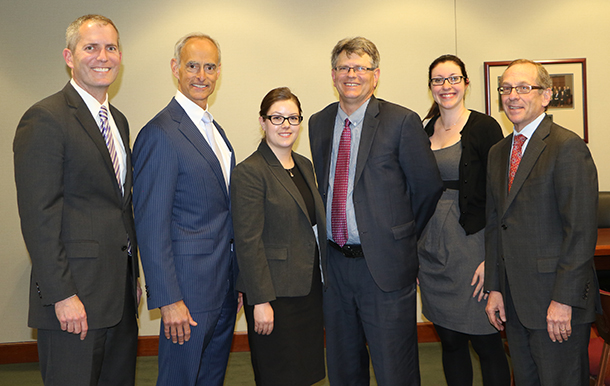
From left: School of Law Dean Robert Vischer, Robins Kaplan Managing Partner Ron Schutz, Robins Kaplan Associate Emily Niles '14, Professor Virgil Wiebe, Robins Kaplan Associate A. Elizabeth Burnett '10 and Robins Kaplan Managing Partner Steve Schumeister.
Virgil Wiebe is the Robins Kaplan Director of Clinical Legal Education. Prior to teaching, Wiebe represented hundreds of immigrants before the U.S. Immigration and Naturalization Service and in immigration court in New York City, and led efforts to create community-based immigration clinics in Manhattan, Queens, Brooklyn and Staten Island. He has actively worked to curb the use of landmines and cluster bombs in armed conflicts, having attended United Nations conferences and addressing diplomats on matters of humanitarian law, and has advised non-profit organizations on establishing immigration programs for low-income communities.
As a scholar, he writes for impact. His most recent law review article, “The Immigration Hotel,” uses the image of a hotel to explain the confounding American immigration system on both technical and policy levels. But he doesn’t just describe the system, he illuminates how the laws came into being and shows how racial and economic barriers to property ownership have often found parallels in the immigration hotel, with the poor and marginalized facing high challenges to securing immigration status as well as stable living situations.
At St. Thomas, Wiebe is one of the principal architects of the university’s unique Interprofessional Center for Counseling and Legal Services, where students from the schools of law, graduate professional psychology and social work provide counseling and legal services to diverse and under-served populations.
“As a teacher, Wiebe is a trusted advisor and mentor to his students,” Vischer said. “The core of his success is keeping a steady focus on both groups of people whose lives are profoundly changed by his work: the clients receiving representation and the students providing it."
